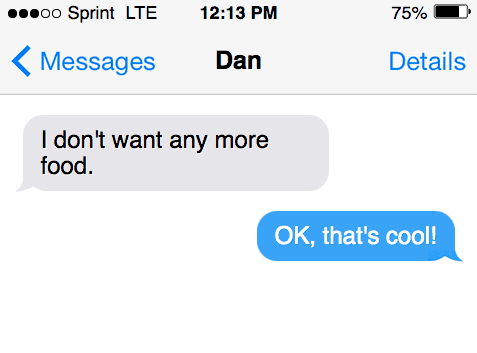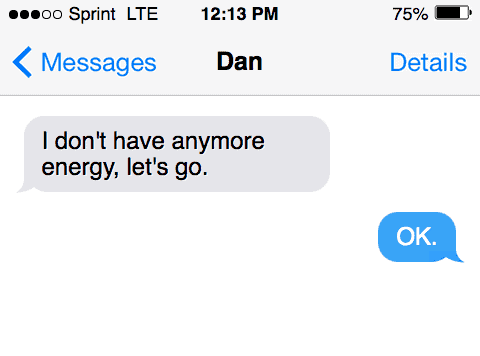Is it anymore or any more? Which is correct? Anymore is an adverb referring to something that is “at present.” While any more is a determiner referring to something that is the “same.” It can be confusing to understand how to use each word in the correct way.
Learn how to use “anymore” and “any more” in this short guide…
What does “anymore” mean?
Merriam Webster defines “anymore” as “something not happening at present time.”
The word “anymore” is considered an adverb.
This word is commonly used to describe something “no longer.” Or something that is to “no further extent.” A sentence example would be the following, “I didn’t feel like going to the basketball game anymore.” Or, “I didn’t think it was relevant to include that information anymore.”

Synonyms
- At present.
- For the time being.
What does “any more” mean?
“Any more” is defined as “a quantity of something with indefinite quantity (or amount).”
The phrase “any more” is considered a determiner.
For example, if describing something that is the smallest amount, you would use the phrase “any more.” A sentence example would be, “I don’t want any more cookies for dessert.” Or, “I don’t want any more money.”
In both of these examples, the phrase “any more” is getting used to describe something of quantity.
Synonyms
- Any
- Some
The adverb “anymore”
Since the adverb “anymore” is used to describe something that is “no longer,” it’s important to use it in the correct sentences.
The correct usage of the adverb “anymore” should get used to describe something that person would like to say “no” for. It’s typical for “anymore” to get used in negative statements. For example, “I’m tiring of doing this. I don’t want to do this anymore.”
“Anymore” typically refers to something in present moment that is “no more.” Here are a few examples to understand how it can get used as one word in a sentence.
Antonyms of “anymore” would include “eventually,” “later,” and “future.”
Correct use of “anymore” in American English is typically found in negative constructions.

Sentence examples
“I’m done with science class, I don’t want to go anymore.“
“It’s not fun anymore. I want to go home.”
“We don’t have to go home anymore. Our parents said that it’s okay to stay out later.”
“If I had to choose between the two ideas, I don’t think I would choose the first idea anymore.“
The determiner “any more”
The determiner “any more” is commonly used to describe something in quantity. When it is not a single word (anymore), it’s usually a contrast of quantity.
“Any more” as a phrase is commonly found in negative statements describing the quantity of something. More may sometimes modify an adjective. Making the word “any” in “any more” the need to be a separate word.
For example, “It doesn’t get any more exciting than now. We are growing this business!”
Sentence examples
“I have so many clothes; I don’t need to buy any more clothes.”
“We have to go home, I don’t think I have any more energy left in me.”
“It’s time to stop fishing. I don’t think there’s any more fish left in this pond.”
“I don’t think I want any more children after this next one is born.”
“No, thank you. I don’t need any more tea. I appreciate you asking.”
How to remember to use “anymore” vs. “any more” in a sentence
The use of anymore in one or two words can change the meaning of a sentence. Remember, anymore talks about time, while any more talks about quantity.
“I shouldn’t get anymore because I can’t eat any more food.”
Or, “I don’t buy shoes anymore because I don’t need any more shoes.”
In these examples, the word “anymore” refers to time. While the phrase “any more” is getting used when referring to quantities.
Other common phrases and alternatives
Similar words and phrases can get used instead of “anymore” or “any more.”
Any further. When desiring to say that a person doesn’t want something, they can use the phrase “any further” as an alternative. The American English use of “any further” is similar to “any more.” For example, “I don’t want to engage in this any further.”
At this time. The phrase “at this time” can also get used in writing as an alternative to “any more.” It is used to refer to time more clearly. For example, “At this time, we are no longer offering an extended discount on shoes.”
Any longer. A variation of “any further,” “any longer” is another way to refer to time clearly. When writing or talking, it’s acceptable to say “any longer.” For example, “I don’t want to go to the basketball game any longer.
Sources
- Synonyms & Antonyms of anymore – Merriam-Webster
- at this time Definitions and Synonyms – Macmillan Dictionary
- any further definition – English dictionary
- Any more or anymore ? – English Grammar Today
- any more | Common Errors in English Usage and More
- Verb Tense Consistency // Purdue Writing Lab
- What Is A Determiner? Types & Examples – Thesaurus.com
Inside this article
Fact checked:
Content is rigorously reviewed by a team of qualified and experienced fact checkers. Fact checkers review articles for factual accuracy, relevance, and timeliness. Learn more.
Core lessons
Glossary
- Abstract Noun
- Accusative Case
- Anecdote
- Antonym
- Active Sentence
- Adverb
- Adjective
- Allegory
- Alliteration
- Adjective Clause
- Adjective Phrase
- Ampersand
- Anastrophe
- Adverbial Clause
- Appositive Phrase
- Clause
- Compound Adjective
- Complex Sentence
- Compound Words
- Compound Predicate
- Common Noun
- Comparative Adjective
- Comparative and Superlative
- Compound Noun
- Compound Subject
- Compound Sentence
- Copular Verb
- Collective Noun
- Colloquialism
- Conciseness
- Consonance
- Conditional
- Concrete Noun
- Conjunction
- Conjugation
- Conditional Sentence
- Comma Splice
- Correlative Conjunction
- Coordinating Conjunction
- Coordinate Adjective
- Cumulative Adjective
- Dative Case
- Determiner
- Declarative Sentence
- Declarative Statement
- Direct Object Pronoun
- Direct Object
- Diction
- Diphthong
- Dangling Modifier
- Demonstrative Pronoun
- Demonstrative Adjective
- Direct Characterization
- Definite Article
- Doublespeak
- False Dilemma Fallacy
- Future Perfect Progressive
- Future Simple
- Future Perfect Continuous
- Future Perfect
- First Conditional
- Irregular Adjective
- Irregular Verb
- Imperative Sentence
- Indefinite Article
- Intransitive Verb
- Introductory Phrase
- Indefinite Pronoun
- Indirect Characterization
- Interrogative Sentence
- Intensive Pronoun
- Inanimate Object
- Indefinite Tense
- Infinitive Phrase
- Interjection
- Intensifier
- Infinitive
- Indicative Mood
- Participle
- Parallelism
- Prepositional Phrase
- Past Simple Tense
- Past Continuous Tense
- Past Perfect Tense
- Past Progressive Tense
- Present Simple Tense
- Present Perfect Tense
- Personal Pronoun
- Personification
- Persuasive Writing
- Parallel Structure
- Phrasal Verb
- Predicate Adjective
- Predicate Nominative
- Phonetic Language
- Plural Noun
- Punctuation
- Punctuation Marks
- Preposition
- Preposition of Place
- Parts of Speech
- Possessive Adjective
- Possessive Determiner
- Possessive Case
- Possessive Noun
- Proper Adjective
- Proper Noun
- Present Participle
- Prefix
- Predicate



